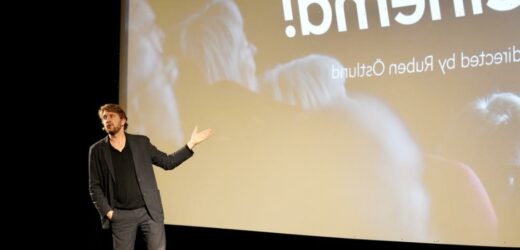GOTEBORG, Sweden — Fast consolidating as one of Europe’s highest-profile filmmakers, Sweden’s Ruben Östlund scored three of the biggest Oscar category nominations last Tuesday – picture, direction and original screenplay – for “Triangle of Sadness,” a send-up of the super rich.
His latest work, however, “This is Cinema!,” billed as “an on-site experience directed by Ruben Östlund,” has seen Östlund directing not a film, but it’s audience. The event took place on Saturday at Sweden’s Göteborg Festival, Scandinavia’s biggest film-TV event.
In it, Östlund climbed on stage to direct a local audience on how to play a far more active part in the cinema-going experience. Greeted with self-critical jubilation by attendees, Östlund’s show sees him join other leading lights on Europe’s film scene, such as Cannes head Thierry Frémaux, in campaigning for cinema as a collective social activity.
Ostlund’s “experience” also comes as art-house cinema has born the brunt of Europe’s still pandemic-decimated slumps in cinema theater attendance, box office plunging 54% in Italy last year, according to Comscore.
For Östlund himself, it also marks a reaction to audiences’ ever more isolated practices of watching content alone on increasingly smaller screens.
Caught by Variety, in the Swedish-language event the filmmaker spent 45-minutes before and during the screening of “Triangle of Sadness” (which also won Östlund his second Cannes Festival Palme d’Or), interacting with his audience in three parts.

He first gave a twenty-minute talk on stage about his philosophy of cinema, before calling out the names of some audience members, and reading out their responses to a questionnaire sent out to ticket-holders prior to the festival. The questionnaire asked a range of questions such as: “Are you happy with your life?” Responses cited by Ostlünd elicited a lot of personal answers and laughs.
“We don’t watch moving images together anymore. This is a problem for the next generation. Previously, we could decide and influence what our children watched. Nowadays the biggest influencers are 14 year olds with larger audiences than public service children’s TV,” Östlund lamented to the audience.
“These are influencers in the hands of large tech companies that are controlled entirely by algorithms, and it is difficult to tell what is advertising or chosen content,” he went on. “A whole generation is being brought up by 14 year- olds that sell make-up products. It’s dangerous.”
Östlund added: “But there is one place that still has a tradition where people curate the content, the cinema. Where humans says: ‘We want to see this,’ such as at the Göteborg Film Festival, for example. A place where we are together, where someone actually can ask us what we think about the images we see.”
The director then directed his audience by asking select audience members to take on different roles. One was appointed a film critic. Another was asked to run out of the cinema in disgust in reaction to the mass vomit scene in the film. Some audience members stood up and shouted “This is cinema!”
At an intermission break, after the first two parts of the film had screened, Östlund chatted to some of the audience in the foyer.
“I wanted to bring up a discussion of cinema culture, and point out that the only unique thing about cinema is that we are watching things together in one room. That is its strongest selling point,” Östlund explained after the event.
Which is where for Östlund that the audience comes in. “To make cinema vital, you have to have an active audience and to get them to let their guard down, open up, and understand they have a role to play together with what’s on the screen,” Östlund argued. “The images we watch should start a discussion afterwards. If that is taken out, you can just as well watch it at home on an individual screen, but when you are watching things together, you need to express your ideas.”
Last November, following in the footsteps of Ingmar Bergman (1994-2007) and Roy Andersson (2009-2018) , Östlund was appointed Honorary President of the Göteborg Festival. That gives him a far more empowered voice in national film debate. His first recommendation is a pre-condition for receiving movie incentives from the Swedish government.
“I’ve suggested to the Swedish Film Institute that when they give us money, we should make a 10-city tour to promote our films, so that cinema owners can sell an event to audiences. That’s 400 events a year in Sweden based on the number of films and documentaries we make. If we do that, cinema culture will be on its way up.”
The 46th Göteborg Festival runs Jan. 27-Feb. 5.
John Hopewell contributed to this article.

Read More About:
Source: Read Full Article


